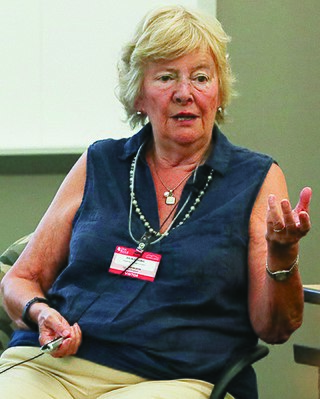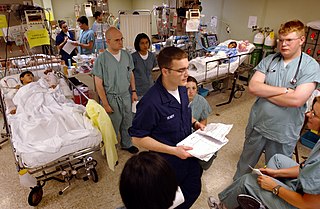The City and Guilds of London Institute is an educational organisation in the United Kingdom. Founded on 11 November 1878 by the City of London and 16 livery companies – to develop a national system of technical education, the institute has been operating under royal charter (RC117), granted by Queen Victoria, since 1900. The Prince of Wales, later King Edward VII, was appointed the first president of the institute.
The Institute of Physics (IOP) is a UK-based learned society and professional body that works to advance physics education, research and application.
The Science Council is a UK organisation that was established by Royal Charter in 2003. The principal activity of The Science Council is the promotion of the advancement and dissemination of knowledge of and education in science pure and applied, for the public benefit. The Science Council is the Competent Authority with respect to the European Union directive 2005/36/EC. It is a membership organisation for learned and professional bodies across science and its applications and works with them to represent this sector to government and others. Together, the member organisations represent over 350,000 scientists. The Science Council provides a forum for discussion and exchange of views and works to foster collaboration between member organisations and the wider science, technology, engineering, mathematics and medical communities to enable inter-disciplinary contributions to science policy and the application of science.
Professional qualifications in the United Kingdom are titles or awards granted by professional bodies. Many British professional qualifications were subject to the European directives on professional qualifications and are covered by amended versions of those regulations as enacted in British law. Most, but not all, professional qualifications are 'Chartered' qualifications, and follow on from having been admitted to a degree. The term "professional qualification" can also be used to refer to higher-level vocational qualifications in "professional" roles.
The Engineering Council is the UK's regulatory authority for registration of Chartered and Incorporated engineers and engineering technician, holding a register of these and providing advice to students, engineers, employers and academic institutions on the standards for registration and procedures for registration. It is also responsible for the accreditation of educational and training programs, delegating this responsibility to licensed member institutions.

Dame Julia Stretton Higgins is a British polymer scientist. Since 1976 she has been based at the Department of Chemical Engineering at Imperial College London, where she is emeritus professor and senior research investigator.

A medical laboratory scientist (MLS) or clinical laboratory scientist (CLS) or medical technologist (MT) performs diagnostic testing of blood and body fluids in clinical laboratories. The scope of a medical laboratory scientist's work begins with the receipt of patient or client specimens and terminates with the delivery of test results to physicians and other healthcare providers. The utility of clinical diagnostic testing relies squarely on the validity of test methodology. To this end, much of the work done by medical laboratory scientists involves ensuring specimen quality, interpreting test results, data-logging, testing control products, performing calibration, maintenance, validation, and troubleshooting of instrumentation as well as performing statistical analyses to verify the accuracy and repeatability of testing. Medical laboratory scientists may also assist healthcare providers with test selection and specimen collection and are responsible for prompt verbal delivery of critical lab results. Medical Laboratory Scientist in health settings also play an important role in the diagnosis of diseses conditions. An estimated 70% of medical decisions are based on laboratory test results and MLS contributions affect 95% of a health system's costs.

Clinical engineering is a specialty within biomedical engineering responsible for using medical technology to optimize healthcare delivery.

An engineering technician is a professional trained in skills and techniques related to a specific branch of technology, with a practical understanding of the relevant engineering concepts. Engineering technicians often assist in projects relating to research and development, or focus on post-development activities like implementation or operation.

The Institute of Physics and Engineering in Medicine (IPEM) is the United Kingdom's professional body and learned society for physicists, engineers and technologists within the field of medicine, founded in 1995, changing its name from the Institution of Physics and Engineering in Medicine and Biology (IPEMB) in 1997. The Institute is governed by an elected Board of Trustees reporting to which are the Science, Research and Innovation Council and the Professional and Standards Council. The councils have operational responsibility for scientific and professional aspects of the Institute's work, respectively. Beneath the councils is a substructure of committees, groups and panels of members, which undertake the work of the Institute.
The Institute of Biomedical Science (IBMS) is the professional body for biomedical scientists in the United Kingdom. The IBMS was founded in 1912 and represents approximately 20,000 members employed mainly in the National Health Service and United Kingdom Health Security Agency and private healthcare laboratories. Other members also work in veterinary laboratories, the National Blood Authority, Health Protection Agency, Medical Research Council and Department for Environment, Food and Rural Affairs, as well as related commercial fields and in teaching. Most members, around 96%, live and work in the United Kingdom and Ireland and some are employed overseas. It aims to promote and develop biomedical science and its practitioners.
In the United Kingdom, a Chartered Engineer (CEng) is an engineer registered with the UK's regulatory body for the engineering profession, the Engineering Council. Chartered Engineers are degree-qualified or can demonstrate equivalent work-based learning and have gained the appropriate professional competencies through education and working experience. Demonstration of competence is defined in the UK Standard for Professional Engineering Competence, assessed through professional review of academic qualifications and professional development. Formal, non-formal and informal learning can be assessed. The title Chartered Engineer is protected in the UK under law by means of the Engineering Council’s Royal Charter and Bye-laws. As of 2019 there are approximately 180,000 engineers registered as a Chartered Engineer. Chartered Engineers are registered through Professional Engineering Institutions (PEIs) licensed by the Engineering Council which are relevant to their industry or specialism.
Chartered Physicist (CPhys) is a chartered status and a professional qualification for physicists awarded by the Institute of Physics. It is denoted by the postnominals "CPhys".

The Royal Society of Biology (RSB), previously called the Society of Biology, is a learned society and professional association in the United Kingdom created to advance the interests of biology in academia, industry, education, and research. Formed in 2009 by the merger of the Biosciences Federation and the Institute of Biology, the society has around 18,000 individual members, and more than 100 member organisations. In addition to engaging the public on matters related to the life sciences, the society seeks to develop the profession and to guide the development of related policies.
The Institute of Science and Technology is a UK-based professional organization which is a member of the Science Council and thereby authorized to award the designation Registered Science Technician (RSciTech), Registered Scientist (RSci) and Chartered Scientist (CSci).
Registered Scientist (RSci) is the name of a qualification in the United Kingdom that is an extension to the Science Council's existing professional registers. It was introduced in 2012. This register extends the framework to allow professional recognition for higher technical roles. Holders of this qualification can use the post-nominal letters RSci. The Registered Scientist and Registered Science Technician (RSciTech), which was introduced at the same time, were developed with the support of the Gatsby Charitable Foundation.
RegTech is a project established by the Prospect union to promote and support the professional registration of engineering, IT and science technicians in the UK.
The Institute of Water is the main professional association for the water industry in the UK.
Science technician is a profession involving working as a member of support staff in any science disciplines. The Science Council defines a technician as “a person who is skilled in the use of particular techniques and procedures to solve practical problems, often in ways that require considerable ingenuity and creativity. Technicians typically work with complex instruments and equipment, and require specialised training, as well as considerable practical experience, in order to do their job effectively”.





